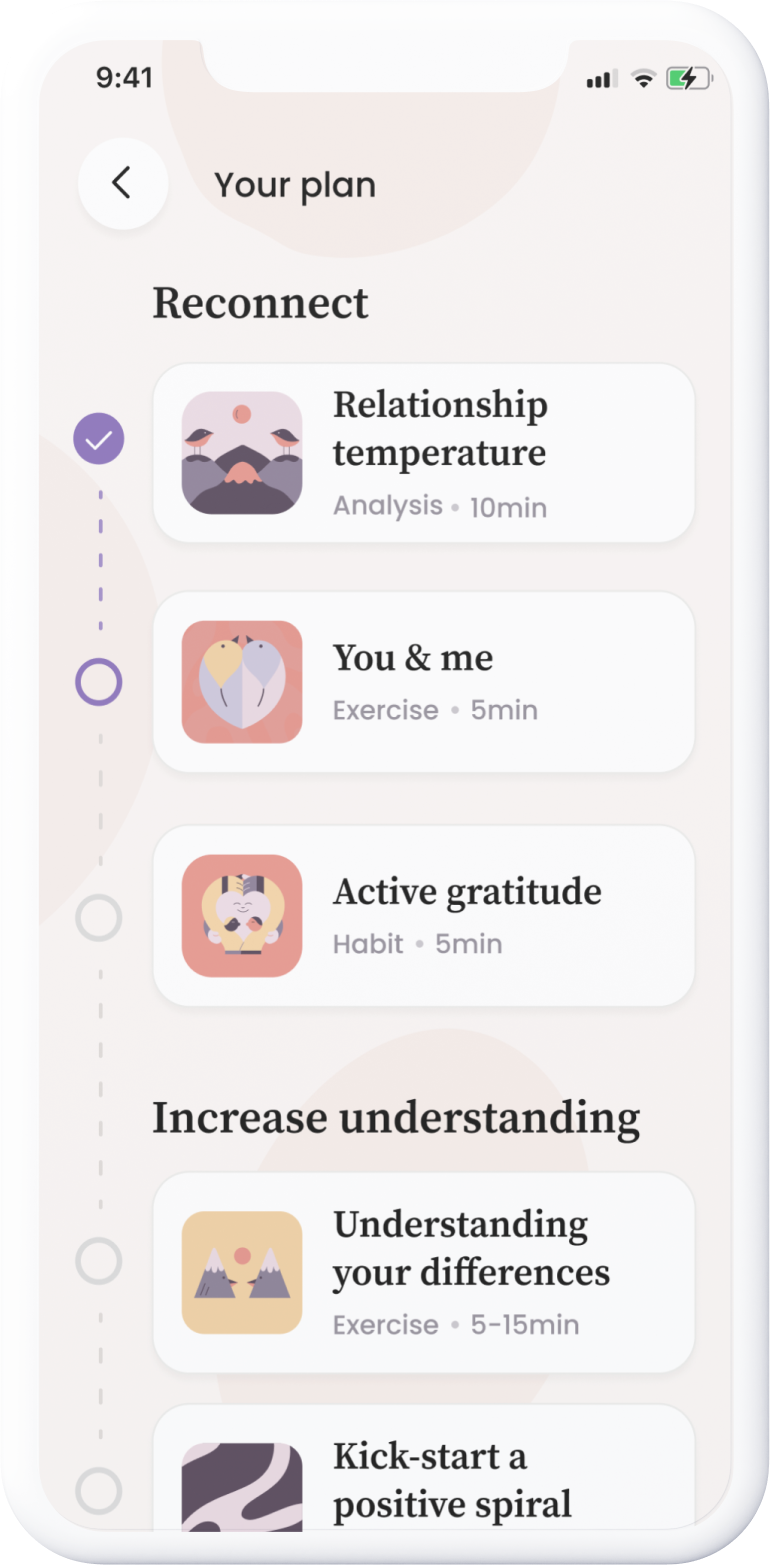Relationship Anxiety Vs. Relationship OCD
Learn the difference between the two conditions and what psychologists say to do if you have either one.- 15 March 2024
- 10min

Do you experience relationship anxiety? Are you often overthinking and find yourself doubting if the relationship is right for you? Or do you constantly search for signs to feel more secure? It can manifest as running online searches for the phrase “happy relationships,” reading articles about love, or comparing your own relationship and feelings to others.
These are all symptoms of “relationship anxiety” and the more severe condition known as “relationship OCD.” And while both are similar, the advice on what to do if you have either one slightly differs.
Relationship anxiety Vs. relationship OCD
Relationship anxiety refers to the experience of feeling anxious or uncertain about one's romantic relationship. Sufferers feel concerns, doubts, and insecurities about their relationships to the point of overthinking the relationship and questioning the compatibility or the intensity of their feelings for their partner. Relationship anxiety is actually a common experience and can be a normal part of navigating and evaluating a relationship.
Relationship OCD (ROCD), on the other hand, is a specific subset of obsessive-compulsive disorder (OCD) that focuses on relationship-related obsessions and compulsions. While relationship anxiety and ROCD both create uncertainty and distress within the context of a relationship, ROCD specifically falls under the umbrella of OCD and involves more intense and persistent patterns of obsessions and compulsions that are specifically related to the relationship. Relationship anxiety is a key part of ROCD, but someone can have relationship anxiety without having ROCD.
More about relationship OCD
The term “relationship OCD” is a term that has gained more attention in recent years. It’s not a diagnosis that’s separate from OCD, but rather one that falls under obsessive-compulsive disorder as a category.
OCD involves intrusive and unpleasant thoughts that create an urge to think or behave in specific ways. Not fulfilling these urges leads to anxiety and the belief that something terrible will happen. It often revolves around questions of uncertainty, such as “What if I get sick from touching that spot?” or “What if I forgot to lock the door?”
In the context of relationship OCD, the obsession focuses on romantic relationships and common intrusive thoughts include: “What if my partner isn't the right one?” or “What if I'm not in love enough?” These thoughts create feelings of uncertainty, which can be distressing. When experiencing uncertainty, the natural response is to seek control and engage in behavior that does that. This can involve seeking reassurance or guidance on whether to stay in the relationship or leave. Experiences can range from thinking positively about the relationship to looking up online articles about "red flags in relationships.”
ROCD sufferers often get stuck in a cycle between anxiety-provoking thoughts (such as “What if my partner isn't the one?”) and reassuring thoughts (like “But we had such a great weekend, and he just texted me a heart!”). It’s an emotional rollercoaster that can become exhausting over time.
Questioning your relationship is common and can be healthy!
Our relationships are important to us, so it's natural for them to evoke thoughts and feelings. Occasional questioning of whether your relationship is right for you is not unusual, especially in the early stages when you are more observant. It’s not uncommon to sometimes overthink things and maybe have occasional, fleeting catastrophic thoughts that can be distressing. But for most people, the periodic anxiety usually passes on its own and doesn't become constant.
Questioning is also common and doesn't necessarily indicate obsession if your relationship has been struggling for a while. The relationship may not be meeting your needs, and your feelings may signal that it's time to take action, like leaving the relationship or seeking out professional help. However, in such cases, the negative aspects of the relationship are often clear, and there are not as many fluctuating thoughts and feelings about it.
Repetitive rumination in a more established relationship without apparent problems can create difficulties, especially for the person experiencing the relationship anxiety. It can be a challenge to experience the positive aspects of the relationship and fully engage with your partner.
7 Symptoms of relationship OCD
Frequently questioning the relationship and feelings for one’s partner
This can involve thinking a lot about the relationship weighing pros and cons. You may wonder about your partner's qualities and question if they are right for you.
Constantly comparing one’s partner and relationship to others
This can involve comparing with friends or others in your circle or observing others' relationships on social media.
Often analyzing one’s own feelings for the partner
You try to assess “how it really feels” and become anxious if you notice that you don't feel overwhelmingly positive about your partner. There is often a misconception that one must always feel in love or attracted in a relationship (which is rarely the case in long-term relationships).
Worrying about not being good enough
You often worry about not being good enough for your partner or constantly feel dishonest toward your partner (e.g., because you are staying with your partner even though you might not love them enough).
Seeking reassurance
This may involve repetitively asking friends for their opinions on your relationship or requesting your partner to show more appreciation, questioning if they truly love you over and over.
Over-consuming relationship-related information
You may, when feeling anxious, search for articles with phrases like "how to have a happy relationship" or "signs of an unhealthy relationship."
Difficulty being content
This can involve constantly searching for something better, such as "the perfect love." Thoughts may arise that say, "If I find the right one, it will feel immediate and obvious."
Common thoughts related to relationship anxiety
Anxious thoughts about your relationship are often triggered by seemingly small external cues, such as seeing someone you find attractive or reading about a description of a happy relationship that doesn't fully align with your own experience.
Here are some examples:
- Am I really in love with my partner? Is this enough?
- What if I regret it and hurt my partner?
- How do I know if I'm truly in love?
- Others seem to feel so much more than I do...
- What if my partner isn't right for me?
- I must feel something more for my partner now, otherwise, it's not right...
- What if my partner meets someone else…
It’s completely normal to have these thoughts occasionally when you’re in a relationship, especially early on.
3 tips for managing relationship anxiety
Relationship anxiety can cause significant suffering and waste a lot of time with anxious thoughts and rumination. It can contribute to an overall negative relationship in the long run. Anyone who’s preoccupied with managing such internal distress can have trouble noticing moments of joy, excitement, happiness, or pride.
Here are some tips that can also be helpful to you with relationship anxiety, whether you fully meet the criteria for ROCD or not.
Step 1) Accept that you don't have full control
Uncertainty is a part of life, and our desire for control is part of the problem! With anxiety, we seek control, but it only provides temporary relief.
Relationships are uncertain, and you can never be 100% sure if your partner is right for you or if the relationship will last. It’s necessary to embrace a certain level of uncertainty.
Step 2) Stop making it worse
Since the goal is to tolerate uncertainty, you need to resist engaging in behaviors that you typically fall back on when feeling anxious and uncertain.
Stop Googling relationship advice and unfollow social media accounts that trigger comparisons. Notice when you get caught up in rumination and find something else to occupy your mind instead of brooding (take a brisk walk, call a friend and talk about something unrelated to relationships, etc). If you constantly seek reassurance from others about the status of your relationship, try to resist doing so.
Step 3) Reframe your thinking about relationships
We need to dispel the myth that we should only experience positive emotions in a healthy relationship. No relationships are always rosy; it's common to feel anger, disappointment, and other negative emotions towards your partner.
Feelings of love fluctuate; they can vary from day to day and in different situations. You can be angry and disappointed with your partner and still love them and want to stay in the relationship. Sometimes the relationship may be 80% good, sometimes 10%, and that can be okay.
However, it's important that the positive aspects of the relationship outweigh the negative, and if the relationship remains consistently at 10% over time, something needs to change.








